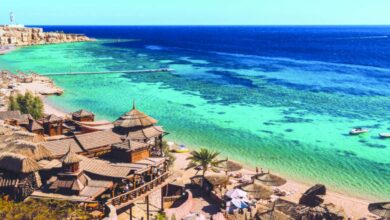
After more than five years of devastation for Egypt's once-booming tourism industry due to intermittent fluctuations and security unrest, AFP reported on Sunday that the industry is recovering and positive indices are taking shape on the horizon.
Omaima al-Husseini, spokesperson for the Tourism Ministry, told AFP that January saw an increase in the number of tourists compared to the same month in previous years.
That month, Tourism Minister Yehia Rashid said 2017 will witness a big boom in tourism according to the indicators and expectations of increasing bookings to the country's tourist destinations. This is compounded by the return of direct flights from a number of major markets including Russia, Britain and Germany to all Egyptian tourist spots.
The statistics showed high influx of visitors from China, Japan and Ukraine which accounted for a large part of the growth. According to China's top public travel agency, China International Travel Service, the number of tourists to Egypt jumped 58 percent in comparison to 2015.
Japan's HIS travel agency said the number of tourists heading to Egypt "multiplied by four or five times last year; since charter flights from Japan to Egypt resumed in April 2016, they have been 80 percent full on average," said a spokesperson for the Japan Association of Travel agents.
According to AFP, there was a modest increase in reservations from other European countries such as Germany and France. "In early February, four other European countries — Denmark, Finland, Norway and Sweden — eased travel warnings against travel to south Sinai, where Sharm el-Sheikh and other resorts are situated," the article said.
German tourist website, Check 24, reported on Monday that Egypt ranked first in terms of tourist bookings in 2017, as the number of tourists who booked trips to Egypt in the first six weeks of this year grew by 84 percent, compared to the same period last year.
Karim Mohsen, the head of Egyptian Federation of Tourism, said that compared to last year bookings increased exponentially in the period between October 2016 and January 2017. "There is an improvement, especially for cultural tourism in Cairo, Luxor and Aswan," he told AFP.
"This uptick is a sign of hope for a country also reeling from the shock of an economic reform programme that has triggered massive inflation," Mohsen added.
The Central Agency for Public Mobilization and Statistics (CAPMAS) reported that the annual inflation rate jumped to 29.6 percent in January 2017 compared to the same month last year.
Tamer al-Shaer, the vice president of the Blue Sky travel agency, told AFP that tourism activity climbed slightly up in 2016-2017 winter season, featuring a 30 percent increase in Ukrainian tourists and a 60 percent rise in visitors from China, with daily flights to Aswan.
The AFP article shed light on the poor situation of the tourism industry since the 25 January Revolution in 2011; despite the sector's attempts to revive it, the industry has been hammered by deadly political crises throughout the past six years.
The article mentioned the suicide attack in June 2015 which targeted a tourist bus near Luxor’s Karnak Temple in Upper Egypt. While in October of the same year, a terrorist attack took down a Russian airliner killing all 224 people on board over the Sinai pennisula.
After this attack Russia suspended flights to Egypt and Britain cut air links with Sharm el-Sheikh.
"Visitor numbers plunged from 9.3 million in 2015 to 5.3 million in 2016," ministry spokesperson al-Husseini said.
The AFP report said Egypt hosted a record 14.7 million foreign tourists in 2010, a year before Hosni Mubarak's overthrow and the ensuing economic decline. "Restoring even two-thirds of that number is a key government goal, but it hinges on Russia and Britain resuming flights," al-Husseini told AFP.
She pointed that negotiations are ongoing to resolve the issue as soon as possible, as more than 60 percent of tourists arriving in Sharm el-Sheikh by plane used to come from Britain or Russia.
"If the Russians do not come back, there will be paralysis, as Russians and Britons are the backbone of Sharm el-Sheikh," the tourism federation's Mohsen told AFP.




